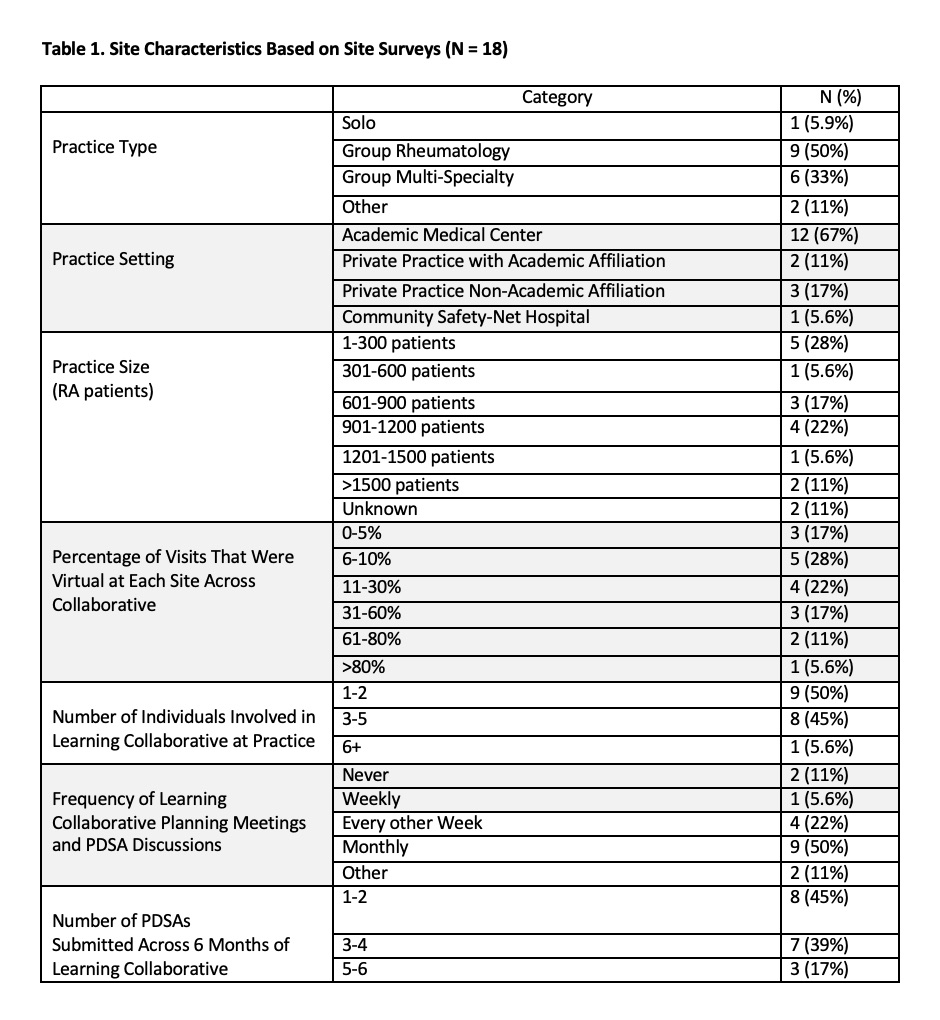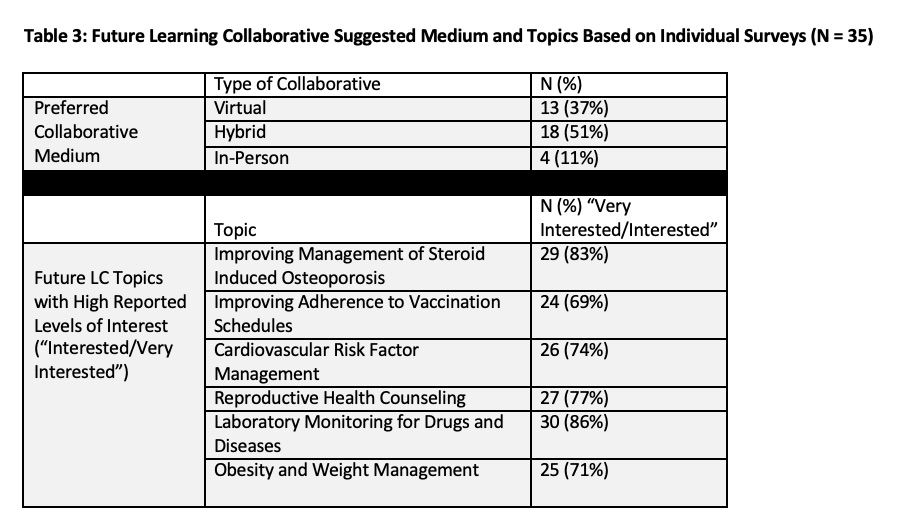Session Information
Date: Monday, November 8, 2021
Title: Health Services Research Poster II: Care Models and Innovation (1061–1082)
Session Type: Poster Session C
Session Time: 8:30AM-10:30AM
Background/Purpose: Learning collaboratives (LC) have been used widely for quality improvement in healthcare, and a recent 9-month in person LC was found effective for improving treat to target (TTT) in RA (1). However, there is relatively little information about the experiences of participants in a virtual LC and little qualitative data or participant feedback on how this format can be improved.
Methods: During the COVID pandemic, we conducted a virtual LC with 18 rheumatology practices. The LC focused on implementing TTT in RA and included a virtual kick-off meeting (run over 5-6 hours) and monthly webinars. The kick-off meeting introduced topics and discussed plan-do-study-act (PDSA) cycles as a main tool for quality improvement. Practices prepared for the monthly webinars with 20-25 chart reviews and submission of PDSA cycles. At the end of the collaborative, leaders of each practice received an anonymous 12 question survey on site characteristics. All 45 participants, including site leads, received a separate anonymous survey focused on their experience in the LC. These questions asked participants to reflect on their participation and evaluate the LC. The following analyses describe the survey responses.
Results: All 18 active rheumatology practices and 35 of 45 participants (78%) responded to the site and individual surveys, respectively. Characteristics of the practices are shown in Table 1 and included multiple practice types, with 12 academic rheumatology practices, 2 academically affiliated practices, and 4 non-academic practices. The number of RA patients seen regularly at participating practices ranged widely from < 450 RA patients to > 1000. The number of participants in the LC at practices ranged from 1 to 8. As noted in Table 2, 63% of respondents indicated they attended 5 or 6 of the monthly webinars. 97% of respondents indicated they were somewhat or very active in monthly PDSA planning and approximately 77% of clinicians submitted chart reviews for 5 or 6 months of the collaborative. Table 2 shows that 94% of respondents indicated they were either somewhat or very satisfied with the LC, and 94% of respondents said they would recommend a similar LC to a colleague. Regarding LC format, 37% of respondents indicated they would prefer a virtual LC, and 51% indicated they would prefer a hybrid (virtual and in-person) model (Table 3). Respondents noted that they would be very interested in future LCs on a range of rheumatology-specific topics (Table 3), including improving management of glucocorticoid induced osteoporosis, cardiovascular risk factor management, reproductive health counseling, and laboratory monitoring for drugs and diseases.
Conclusion: Virtual multi-center LCs are feasible, and participants were very satisfied with the virtual format. Virtual LCs are highly valued by rheumatologists, trainees, and their practice staffs. Potential topics were identified for future LCs that could improve the quality of care delivered to rheumatology patients.
1. Solomon, D. H., et al. Implementation of Treat-to-Target in Rheumatoid Arthritis Through a Learning Collaborative: Results of a Randomized Controlled Trial. Arthritis Rheumatol 2017;69:1374-1380.
To cite this abstract in AMA style:
Ellrodt J, Smolen J, Pincus T, Shadick N, Katz J, Santacroce L, Stratton J, Solomon D, Chatpar P, Stocks M, Mundell B, Downey C, Torralba K, White D, Baudek M, Szlembarski S, Barnhart S, Bilal J, Redford A, Lee D, Buchfuhrer J, Kramer H, Kwoh C, Villatoro-Villar M, Patnaik A, Guzman E, Trachtman R, Tesser J, Music D, Mickey L, Amin M, Potter J, Sundhar J, Sheingold J, Schmukler J, Horowitz D, Gulko H, Quinet R, Dhulipala S, Patel R, Keshavamurthy C, Carvajal G, Dunn R, Kumar B, Lenert A, Zembrzuska H, Gebre M, Lenert P, Anandarjah A, Yang A, Grinnell-Merrick L, Goldsmith S, Zelie J, Wise L, Zagelbaum Ward N, Kaine J. Satisfaction with a Virtual Learning Collaborative Aimed at Implementing Treat to Target (TTT) in Rheumatoid Arthritis (RA) [abstract]. Arthritis Rheumatol. 2021; 73 (suppl 9). https://acrabstracts.org/abstract/satisfaction-with-a-virtual-learning-collaborative-aimed-at-implementing-treat-to-target-ttt-in-rheumatoid-arthritis-ra/. Accessed .« Back to ACR Convergence 2021
ACR Meeting Abstracts - https://acrabstracts.org/abstract/satisfaction-with-a-virtual-learning-collaborative-aimed-at-implementing-treat-to-target-ttt-in-rheumatoid-arthritis-ra/



